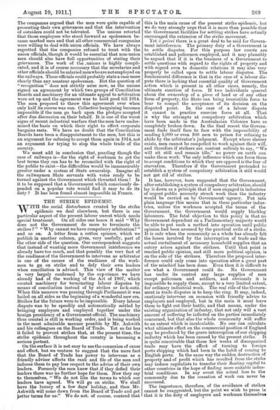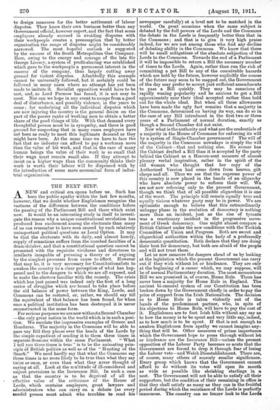THE STRIKE EPIDEMIC.
WITH the social disturbance created by the strike epidemic we deal elsewhere, but there is one particular aspect of the present labour unrest which needs special treatment. On all sides one hears it said " Why does not the Government do more to terminate the strikes ? " " Why cannot we have compulsory arbitration? " and so on. A letter .from a cotton spinner, which we publish in another column, gives, very usefully, part of the other side of the question. Our correspondent suggests that instead of wanting more Government interference we already have too much, and that possibly the very fact of the readiness of the Government to intervene as arbitrator is one of the causes of the readiness of the work- men to go on strike and to defy their own leaders when conciliation is advised. This view of the matter is very largely confirmed by the experience we have already had of the working of the Act of 1907, which created machinery for terminating labour disputes by means of conciliation instead of by strikes or lock-outs. When this measure was passing through Parliament it was bailed on all sides as the beginning of a wonderful new era. Strikes for the future were to be impossible. Every labour dispute was to be speedily and automatically settled by bringing employers and employed together under the benign presidency of a Government official. The machinery thus created. is still in working order, and is being worked in the most admirable manner possible by Mr. Askwith and his colleagues on the Board of Trade. Yet so far has it failed to prevent strikes that, at the present time, the strike epidemic throughout the country is becoming a serious portent.
. On the surface it is not easy to see the connexion of cause and effect, but we venture to suggest that the mere fact that the Board of Trade has power to intervene as a friendly adviser affects the rank and file of the men and induces them to pay less respect to the advice of their own leaders. Formerly the men knew that if they defied. their leaders there was no further hope for them. Now they say to themselves, " We do not like the terms to which our leaders have agreed. We will go on strike. We shall have the luxury of a few days' holiday, and then Mr. Ask with will come down from the Board of Trade and get j>etter terms for us." We do not. of course, contend that this is the main cause of the present strike epidemic, but we do very strongly urge that it is more than possible that the Government facilities for settling strikes have actually encouraged the extension of the strike movement. Yet a priori there is a great deal to be said for Govern- ment interference. The primary duty of a Government is to settle disputes. For this purpose law courts are established. and policemen employed, and it may plausibly be argued that if it is the business of a Government to settle questions with regard to the rights of property and with regard even to domestic relations it may also very properly be called. upon to settle labour disputes. The fundamental difference is that in the case of a labour dis- pute there is lacking that essential quality of Government action which is present in all other cases, namely, the ultimate sanction of force. If two individuals quarrel about the ownership of a piece of land. or of any other form of property, the State can bring irresistible force to bear to compel the acceptance of its decision on the disputed point. In the case of a labour dispute it cannot in practice exercise force at all. That is why the attempts at compulsory arbitration which have been made in the Australasian Colonies have so completely broken down. In the final resort the Govern- ment finds itself face to face with the impossibility of sending 1,000 or even 100 men to prison for refusing to abide by the arbitrator's judgment. Except where slavery exists, men cannot be compelled to work against their will, and therefore if strikers are content sullenly to say, "We will sit still and remain idle," no power on earth can make them work. The only influence which can force them to accept conditions to which they are opposed is the fear of starvation. Therefore if the Government pretended. to establish a system of compulsory arbitration it still would not get rid of strikes.
It has, however, been suggested that- the Government, after establishing a system of compulsory arbitration, should lay it down as a principle that if men engaged in industries of urgent public necessity struck work then the industry would be carried. on by Government 'agency. Put into plain language this means that in these particular indus- tries, unless the workmen accepted the terms of the Government, the Government would. supply blackleg labourers. The fatal objection to this policy is that no Government dependent on a Parliamentary majority would. be able to put such a method into operation until public opinion had been aroused by the practical evils of a strike. It is only when the community as a whole has already felt the losses involved by the interruption of trade and the actual curtailment of necessary household supplies that an outcry arises against the strikers. Until that point is reached. public opinion, and still more political opinion, is on the side of the strikers. Therefore the proposed. inter- ference could only come into operation after a great part of the mischief has been done. Even then it is difficult to see what a Government could do. No Government has under its control any large supplies of men except policemen and soldiers, and obviously it is impossible to supply these, except to a very limited extent, for ordinary industrial work. The real role of the Govern- ment in trade disputes is to keep the ring. It may, indeed, cautiously intervene on occasion with friendly advice to employers and employed, but in the main it must leave them to fight out their battle, and that means, under the existing organization of industry, that not only will a vast amount of suffering be inflicted on the parties immediately concerned, but that also the whole community will suffer to an extent which is incalculable. No one can calculate what ultimate effect on the commercial position of England. may be produced by the grave interruption of our shipping industry which has been caused. by the present strike. It is quite conceivable that these few weeks of disorganized. trade may have the effect of turning to foreign ports shipping which had been in the habit of coming to English ports. In the same way the sudden destruction of property and of profit which has resulted from the .strike may induce capitalists to transfer their floating capital to other countries in the hope of finding more suitable indus- trial conditions. In any event the actual loss to the community due to the cessation of work can never be recovered. The importance, therefore, of the avoidance of strikes cannot be exaggerated, but the point we wish to press is that it is the duty of employers and workmen themselves to design measures for the better settlement of labour disputes. They know their own business better than any Government official, however expert, and the fact that some employers already succeed in avoiding disputes with their workpeople creates a presumption that by better organization the range of disputes might be considerably narrowed. The most hopeful outlook is suggested by the success of the South Metropolitan Gas Company. Here, owing to the energy and courage of the late Sir George Livesey, a system of profit-sharing was established which gave to the workpeople a permanent interest in the success of the company, thus largely cutting away ground for violent disputes. Admittedly this example cannot be universally followed, but it certainly could be followed in many cases where no attempt has yet been made to imitate it. Socialist opposition would have to be met, and, as Lord Furness has found, it is not easy to meet. Nor can we hope in any event to escape from a good deal of disturbance, and possibly violence, in the years to come ; for underlying all the individual disputes which are now injuring the country is the general desire on the part of the poorer ranks of working men to obtain a better share of the good things of life. With that demand every thoughtful person must be in sympathy, and there is good ground for suspecting that in many cases employers have not been as ready to meet this legitimate demand as they might have been. At the same time we have to face the fact that no industry can afford to pay a workman more than the value of his work, and that in the case of many human beings the value of their work is so small that their wage must remain small also. If they attempt to insist on a higher wage than the community thinks their work is worth their labour will be dispensed with by the introduction of some more economical form of indus- trial organization.



































 Previous page
Previous page